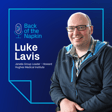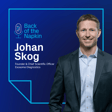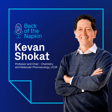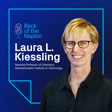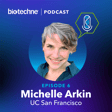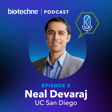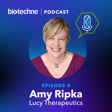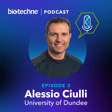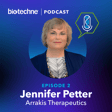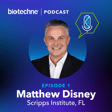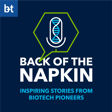Become a Creator today!Start creating today - Share your story with the world!
Start for free
00:00:00
00:00:01

Season One Recap - Back of the Napkin
We are delighted to announce that Season 2 is on the horizon!
As we work to bring you more great conversations, let’s reflect on the most valuable discussions from a stand-out Season 1.
In this episode, we revisit essential topics like ideation, collaboration, entrepreneurship, and the future of drug discovery.
Subscribe to our mailing list to receive email notifications of new uploads: https://www.bio-techne.com/resources/podcast/biotech-podcast-back-of-the-napkin#subscribenow
Transcript
The Journey of Discovery
00:00:03
Speaker
A discovery is said to be an accident meeting a prepared mind, but every story behind a discovery is different.
Scientific Pioneers and Innovation
00:00:11
Speaker
Perhaps the idea is conceived in a light-bulb moment, or a brainstorming session, or captured in scribblings on the back of a napkin. Here, we introduce you to scientific pioneers, taking you beyond their publication, and into innovation corners to hear the untold stories behind their discoveries.
Podcast Introduction
00:00:30
Speaker
This podcast is brought to you by Biotech, and I'm your host, Alex Maloney.
00:00:36
Speaker
Hello and welcome to Back of the Napkin. It has been a while but we have been hard at work on recording season two which features some fantastic guests and I'm really excited to bring this to you soon. If you enjoyed season one and want to keep up to date please go ahead and subscribe on whichever platform you listen to your podcast
00:00:58
Speaker
on, and if you're feeling particularly generous, why not go ahead and leave a 5 star review.
Revisiting Key Themes: Ideation & Collaboration
00:01:03
Speaker
It would be enormously appreciated and helpful.
00:01:08
Speaker
Okay, so the purpose of this episode is to do something a little different. I wanna go back and revisit some of the conversations we had in season one with our six guests and pull out some of the key themes and points that were shared across these episodes. And they centered around ideation, collaboration, entrepreneurship, and the future of drug discovery.
00:01:37
Speaker
But before we go on to that, let me thank you, the listener, for tuning in.
Insights from Amy Ripka on Focus & Music
00:01:41
Speaker
I hope you've enjoyed these episodes as much as I've enjoyed recording them. It has been an enormous privilege to welcome the guests we've had on, and I've learned a huge amount from this. Okay, so let's start with ideation. This is back of the napkin, the canvas of creativity where ideas are scribbled down.
00:02:02
Speaker
And the guest I would like to start with is Amy Ripka, CEO of Lucy Therapeutics and also a professional violinist. Amy has a fantastic way of thinking and breaking down a problem. So let's go back to a conversation we had with Amy. Yeah, this is something I really want to get out to the podcast verse. I think there's a lot of pressure on kids and students to focus on one thing.
00:02:31
Speaker
this pressure that in order to be good at anything, you have to almost make that your exclusive focus. And this is, I think, a more recent development. Certainly in the Renaissance, this was not the case. And I think throughout history, this has kind of been in favor or gone out of favor. But I am a firm believer that
00:02:48
Speaker
Having a singular focus can make you potentially blind to other ways of looking at a problem. I think music was something that, for me, when I was doing it, I couldn't think about chemistry. It was also a way of clearing my head. You can't be on stage performing and be distracted. You will give a terrible performance.
00:03:09
Speaker
I think it allowed my brain to rest and to not
Neil on Collaboration and Innovation
00:03:13
Speaker
think about. It taught me how not to compartmentalize, I think that's the wrong word, but how to really focus on different things and not have that cross-contamination. But by doing that, when I went back to chemistry or come back to a problem, somehow my brain was refreshed and I was able to see it in a different way. Whereas if I just kept pounding on the problem, I found I could often get locked into a certain way of thinking about it.
00:03:36
Speaker
This may not be the same for everyone. I mean, music for me allows this kind of flexibility to really disengage and then reengage. But music also allows me to remember that you have to think about a lot of variables at the same time. When you're playing the violin, it's not just playing the right notes. It's what are you trying to communicate? What's your phrasing? What are the dynamics? Are you playing with other people? Did someone on stage just create a phrase or do something unexpected that you want to amplify?
00:04:05
Speaker
And again, one can think about this in the biotech world, too. I think when you're thinking of where do new ideas come from, they often don't come in a straight line. Like, I'm working in this field, and then I did this, and then I did this. You may have gone to some...
00:04:20
Speaker
I don't know, random lecture. Someone talking about physics or someone talking about trophic cascades in ecology. This actually happened to me. Trophic cascades have a lot in common with drug discovery. It turns out the idea of a trophic cascade in ecology is that you have predator or prey, and when you remove one of those from the system, you have this cascading events in the different levels of the ecological system.
00:04:44
Speaker
It's kind of the same as a drug, right? You want to intervene in a very particular way, in a complex system, and how is that effect going to cascade down or up?
Serendipity and RNA Targeting
00:04:54
Speaker
Having singular focus can make you potentially blind to other ways of looking at a problem is one of my favorite quotes from season one of the podcast.
00:05:07
Speaker
And next, I'd like to go on to a discussion we had with Neil Devaraj. Neil is professor at the University of California, San Diego, where he works across a broad range of topics, including the design of synthetic cells, RNA editing, and more broadly, bio-orthogonal chemistry.
00:05:28
Speaker
Neil's described by greats like Carolyn Vatozzi as a singularity in chemical biology. And I think it's Neil's breadth of understanding across biology and chemistry that's brought together some of these fantastic ideas in a way that hasn't been done before. So here's a look at how Neil brings together these ideas where I ask him what his process is for ideation. I think it's always a little different, but I think
00:05:57
Speaker
A lot of times it starts with actually sitting in a seminar and hearing something. It could be tangential, but it can sometimes spark an idea or, you know, I really didn't think about that and I didn't really realize that was a problem.
00:06:11
Speaker
And how could you solve a problem? A lot of times it comes with just talking with colleagues. I think that's been a recurring theme, I think, through a lot of these ideas, having really great colleagues that are accessible, that you can chat with, that often are in different disciplines or have different expertise.
00:06:29
Speaker
so that you can gain sort of windows into areas that you may not be necessarily so familiar with, which is often for me an issue. Surround yourself with great and diverse minds to collectively bring together ideas that you can go on and pursue.
00:06:46
Speaker
Okay, the next topic of ideation that I want to revisit is from the episode with Alessio Chile. Alessio is the director of the Center for Targeted Protein Degradation at the University of Dundee. And Alessio is a very careful and strategic thinker, always thinking about the long-term goal and vision of a project. So let's go back to a clip from episode three.
00:07:14
Speaker
We often hear that luck meets the prepared mind. And I think that's very true. You sort of search your luck. And so activity is really important. You can think deeply about how to do experiments or what to do and try to be perfect. Sometimes you just have to get on them.
00:07:37
Speaker
Obviously carefully designed experiments are very important with the right controls and by no means that's really important in science. But sometimes don't overthink too much and just get on and do what you can.
00:07:52
Speaker
with what you've got. I think it's really important. With a long vision, with a long view of where you might go with your research program in a way that is exciting and is not sort of boring. And that excitement comes from doing things differently or trying things that are maybe hard, that are challenging, try to tackle some challenges.
00:08:19
Speaker
but they still be very practical in what you can actually achieve with you. Luck meets the prepared mind and there's lots of cases where serendipity plays part in new discoveries and I think it's being open to the idea that things twist and turn along the way to new discoveries that is very important.
00:08:42
Speaker
Another great example of that is from the episode with Jennifer Petter, founder of Arrakis Therapeutics, a company built on the idea that you can selectively target, not just proteins, but RNA with small molecules. Jen is one of the best in the business when it comes to drug discovery, so hearing about the moment she heard about this new idea of targeting RNA was really fascinating to follow.
00:09:10
Speaker
Yeah, so again, letter in May, and then I already arranged to go to this Gordon conference. It was a Gordon conference on high throughput chemistry and chemical biology. And there was a session there on RNA in small molecules. And I'm sitting through this session just thinking, I did not get the email. This is a thing? We are doing this? So first of all, I'm embarrassed that I hadn't really heard about this.
00:09:37
Speaker
But second, I'm very excited. Like, I want to do that. I have a whole closet full of kinase t-shirts from teams and blah, blah, blah. It's like, it's fine. I don't need to do that anymore. But to drug RNA with small molecules just struck me as great. And I should say I want to do this. It wasn't that I knew what the answer was or that I thought anyone else had the answer. It's because I liked the problem. So that was really the, and what's funny is that,
00:10:05
Speaker
This coming July, I have been invited to talk at that Gordon conference. So that should be fun. For me, this whole paradigm shift in how you can use small molecules to target RNA has been really exciting. So getting to invite Matt Disney on as a guest was an enormous privilege. Matt is a professor at the University of Florida Scripps Institute.
00:10:32
Speaker
and is continuing to show what is possible with this approach. So here's Matt talking about the early days of this new and exciting area of targeting RNA with small molecules.
The Role of Collaboration in Science
00:10:46
Speaker
We could take a library of small molecules and select what RNA structures they bind to. And so that was a eureka moment because I was in the lab doing that. And the second eureka moment is when we decoded the binders for
00:11:02
Speaker
uh, a version for one compound. And I did some rudimentary calculation by approach that we call now in Forna, which is basically taking that data on the RNA structures with RNA structure prediction to find partners. We found a ligand that bound to an RNA that causes myotonic dystrophy type two. So I was like, oh, this, this is, this is going very rapidly from a basic science question, namely what RNA is buying small molecules to
00:11:32
Speaker
Wow, this data might have a use to help a human being, other than me getting my NIH grant funded. And so we were excited by this, and we published a compound that could bind this RNA structure with high affinity and specificity. And then that, so I tell people, I ask me, well, Matt, why were you working in RNA repeat expansions? How did you find it?
00:12:01
Speaker
We didn't find it. It found us. The selection experiment at the beginning told us to work in this area. And I was very happy with that because it was a rare disease. My niece has a rare disease. Michael's oldest daughter, Caitlin. So I thought, whoa, this is like, I need to be working on this.
00:12:25
Speaker
Another example of serendipity in discovery. The next theme that was central to this podcast was the importance of collaboration and several of the guests headed up facilities built around collaboration. I was lucky enough to get to visit the Center for Targeted Protein Degradation. So I want to go back to the episode with Alessio, where he discusses the importance of collaboration.
00:12:51
Speaker
And I think that aspect of collaboration is really important. We collaborate widely, obviously internally amongst ourselves, and that's really important. But actually also with the rest of the world, we collaborate with lots of companies such as Torcris Biotechnique, we've had long standing collaboration, collaboration.
00:13:10
Speaker
activities and programs and we're excited to have you visit us today and tomorrow so we'll talk a lot more about how we can continue to innovate and how we collaborate together but collaborate with
From Ideas to Companies
00:13:23
Speaker
many other partners but also collaborate with many other academic groups.
00:13:27
Speaker
We like to work with like-minded people that share our passion for science and our goal to make new discoveries. That innovation on how we collaborate is also the realization that you can't know it all yourself and you always learn something new when you work with somebody.
00:13:49
Speaker
When we walk down the road just arriving here, it's written in big on the building. Is this kind of your motto? What is it? Yes, correct. Innovate, collaborate, inspire. Innovate, collaborate, and inspire. Words to live by and perhaps three of the most important ideas that we continue to hear throughout this series. Let's go back to listen to the importance of collaboration from another guest.
00:14:17
Speaker
Michelle Arkin is professor at the University of California, San Francisco, where she's also the director of the Small Molecule Drug Discovery Center. Michelle is a big proponent for collaboration and building a team of people in an environment where exciting science can happen and is encouraged. So let's take a listen back to this discussion on collaboration with Michelle.
00:14:42
Speaker
To answer your original question, I think collaboration is everything. I don't think I've ever had an idea or a goal that I could do completely by myself.
00:14:55
Speaker
And collaboration starts with the people who work with you in your lab, the people who work next to you, the faculty that, or in a company, the colleagues that do different things that are overlapping that are required to make this idea flourish, to address the questions that you have. And there's been something of a revolution in academics, maybe over the last 15 years, I've seen it a lot.
00:15:26
Speaker
just move towards an appreciation that team science is a valuable thing. It can give you unique results. It's not something you have to do or something that the funder requires you to do. It's actually grassroots what you want to do to make progress. And it's
00:15:47
Speaker
it's fun. And science, like it or not, science is done by people. I think a lot of us became scientists because politics felt like there was no ground truth or literature or art seemed like everything was fine. There's an objective, I feel as a scientist, I think a lot of people do, that there's an objective reality that we're trying to get to and build on and grow and
00:16:15
Speaker
But even though there is that objectivity, everything you're going to do or discover or think about is done with people, was done by people. So it's always been highly collaborative.
00:16:29
Speaker
collaborating with the literature. It's always been that way. So pulling that forward and having that be not a bug but a feature of science is a great direction. I'm really happy to see it go this way.
00:16:46
Speaker
Throughout the series, we've had the pleasure of speaking to people who have been able to take their collaborations, their innovations, their ideas, and turn these into companies. Not every company starts in the same way, and I've particularly enjoyed listening to the different
Jennifer Petter's Founding of Arrakis Therapeutics
00:17:03
Speaker
stories and the motivations around the moments where the obvious next step is to turn an idea into a company.
00:17:14
Speaker
So let's move on to the next theme then in this episode, which is entrepreneurship. And I'd like to go back to the discussion with Jennifer Petter about a connection she had over breakfast and the inception of her company, Arrakis Therapeutics. All right, so here we go. First of all,
00:17:35
Speaker
Following that June thing, I talked to some friends and they put me back. I mean, and I ended up talking to Raj Parekh, who's a managing partner at Advent Life Sciences, which is a British VC firm. And they had been involved with Avila. So that man had made some money on me and was willing to do breakfast. And it turns out that Advent had already been thinking very deeply about RNA and small molecules for about a year. And so startup companies are like a ham and eggs breakfast. The chicken participates, but the pig is committed.
00:18:05
Speaker
and I self-identify as a pig. So I'm sitting in front of him at breakfast, like I'm ready to do this, like just to start this right now. And so by the end of that breakfast in July of 15, I had $2 million, one and a half from Advent Life Sciences and half a million from Henry Terrier.
00:18:22
Speaker
And we got started with seed money. And so I actually left the company about four weeks later, and we got going. Now, it turns out that there had been a previous entity looking at microRNAs that Advent had produced. They wanted to dissolve that and create something new. And some associate from Advent called me up and said,
00:18:45
Speaker
Hey, we need a name. What do you want to call a company? All right. Pause. Sidebar. So it turns out I've been thinking about company names, blah, blah, blah. And I noticed I was looking at these WDR proteins, which are these propeller proteins.
Amy Ripka's CEO Experiences
00:19:00
Speaker
And when you look at the x-ray structures of these WDR, and you look at them in a certain way, to my geeky mind, they look like the maw of a sandworm. So I thought, I've wrapped it.
00:19:12
Speaker
a sandworm being the massive creature in that exactly i'm sorry the sandworm being the massive creatures that flow that swim under the sand and actually are responsible for making spice i will come back to that
00:19:23
Speaker
So I thought them all. So that just kind of planted the seed in my mind. And so then when they asked me what kind of company, what do you want to do for the name of the company, I said, how about Arrakis? A-double-R-A-K-I-S. They said, OK, that sounds good. We'll get back to you. Or maybe something more like, it sounds lovely. We'll get back to you.
00:19:44
Speaker
And for some advice on how to be a CEO, let's have a listen to what Amy said with her retrospective look back at what she would tell Amy Ripka on day one of being CEO of Lucy Therapeutics.
Entrepreneurship in Biotech
00:20:00
Speaker
I would say to Amy on day one, you should have five or six other CEOs on speed dial. It is something that I think I didn't have the respect for the job that I do now.
00:20:14
Speaker
You deal, you know, the buck stops with you. So ultimately, you know, all the bad stuff, you know, you have to take ownership or you should take ownership of not all CEOs do this, but I think that's important. And I think you should give credit for the good stuff to your to your team. Right. So.
00:20:32
Speaker
You have to realize as a CEO, there are a lot of competing streams that not everyone is going to be aware of the organization. You have financial streams and financial pressures. You have financing and deals that you need to make. You have business decisions of how you're going to structure those to move the company forward in the way you want.
00:20:53
Speaker
organizational challenges. You have to figure out what kind of culture you want to build, and if people fit into that culture or don't fit into that culture, what are you going to do? How are you going to handle that? Are you going to build a culture that's very much in the model of how things have always been done, or are you going to try something new? Which may mean you might get pushback from different people, people in your organization, people outside your organization.
00:21:18
Speaker
I think it's very challenging. Again, music informs this. When you're performing, you have to keep in your head equally many widely different inputs simultaneously, whether it's how you hold your instrument, all the things I mentioned before. Dynamics, who else is on stage? What's the conductor doing? Is your mic working?
00:21:40
Speaker
Being a CEO is very much the same. There's different pressures on your time. You have to keep all the balls in the air. One orchestra manager once told me, if only 20% of the musicians are complaining at any given time, you're probably doing a good job. With CEO, it's probably similar. The biggest thing though is you just have to keep going.
00:22:06
Speaker
Okay, so both Jen and Amy have a wealth of experience outside of academia. So it was also good to get the perspectives from academics who were starting companies. Entrepreneurship isn't easy or straightforward. So I'd like to go back to a discussion with Matt Disney, where he talks about starting expansion therapeutics. Okay, so I'm the guy of low expectations, which many of you
00:22:35
Speaker
listening to this might think, what are you talking about? I never sought to start a company. People came to me. So we had Advent Ventures talk to me. Well, a lot of people talk to me about starting a company. I didn't start all the companies that I could have. Many, I think, incubated out of the idea that we had in the lab. And so
00:23:05
Speaker
What happened with expansion is I had a lot, actually that got founded, there was a lot going on in my life at that time. Actually right before my mother passed away, my father passed away like within four to six weeks of each other. So it was very complicated time in my life. And during that I had many people ask me to start a company and it was just hard for me to focus on that given everything that was going on at the time.
00:23:35
Speaker
What had me, gave me pause, I think is that one is I wanted to take whatever gifts that I had or whatever work that the lab was doing and be able to help people. So I wanted to be able to do that. The second thing is that I was not educated about biotech companies. And so when I had people talking to me about it,
The Future of Drug Discovery
00:24:04
Speaker
I would always in my head think this is too good to be true or this is they're talking to you, oh, we're going to found a company and we're going to make X millions of dollars. And that got me very uncomfortable because I'm not in this for money. And I would worry that I would talk to the VCs and they would want to do something to make money. I wanted to make a drug.
00:24:25
Speaker
For Michelle Arkin however, entrepreneurship wasn't something new and she was able to facilitate the start-up of Ambigon Therapeutics with her collaborators through her extensive network of contacts and experience. Ambigon are doing some really exciting work on the so-called undrugable targets, so it was great to hear about its inception from Michelle.
00:24:48
Speaker
This comes back to what you were asking about with collaboration before and how important people are to the equation. Working with Christian and Luke in their labs has been such a fantastic experience for me and for my lab. They're wonderful people and I really enjoy talking science with them.
00:25:14
Speaker
So in developing some of these projects together, it became clear that it's been Christian's dream to start a company and he started a company called the Ambigan when maybe he was even a graduate student. The idea was that these natural products, they're humble natural products that act as herbicides and then the fungus eats the dead plant. And his company Ambigan was going to turn these natural products into
00:25:45
Speaker
herbicides into weed killers. That idea for the company didn't go forward, but this idea was always in his mind that he wanted to have this company ambigon and he wanted to turn it towards biomedical application. This is where my being in the Bay Area and having some contacts in industry was helpful because he came into the sabbatical
00:26:09
Speaker
at UCSF one summer and we started pitching the company. It was really amazing to me to help him build his dream company to make this dream come true. He works there now. He's more or less left the university and he's there full-time as the chief technology officer and
00:26:30
Speaker
It's great. Luke and I work a lot with the company, advise, keep tabs on what they're doing, talk to the song just frequently. And it's super exciting to see this realized. But to your scientific question, target selection is really challenging.
00:26:51
Speaker
because there are so many targets. It's the first company that any of us has started and two of the people are in Europe and we're going to have a company that's partially in Europe and partially in the United States because that's what makes sense. New technology, new targets, new founders, new business model,
00:27:11
Speaker
it took some effort to get a group to understand. And we ended up with an amazing group of investors, several investors putting small amounts of money for them to see this company. The final topic, the future of drug discovery. What have we got to look forward to? Well, the short answer is a lot. And I'd like to start with Jen's perspectives on what's to come.
00:27:38
Speaker
So I actually think that this induced proximity field, it's still expanding, but I think it's already demonstrated that it is transformative, all right?
00:27:59
Speaker
So there's the original sort of suite. You might call it induced proximity 1.0, which is really about recruiting E3 ligase, which is great. And our Venice has done a great job. There's some hiccups with the lead drug. But drugs are tough to develop under the best of circumstances. So huge props to them.
00:28:28
Speaker
And I think they'll get through that. So I think there's gonna be a big plus out of that. But now what's happening is that this induced proximity, people are recruiting kinases, they're recruiting phosphatases, they're recruiting occasionally proteases, but also dubs, right? To go in the opposite direction, to take the ubiquitants off rather than to put them on.
00:28:56
Speaker
And I think that just on the protein side, once you expand a bit, you begin to see that the mechanistic generality of that approach is going to continue to produce new and exciting outcomes. And then I think with RNA, we're going to see something very similar. And even in the protein now, there's the able to go after sort of extracellular targets.
00:29:22
Speaker
you know membrane targets it's really spectacular. You know the challenge there will be you know you've once again from a molecular perspective put yourself into the beyond rule of five space and so we're going to have to find new ways to to make sure those molecules are well absorbed and distributed. I think that
00:29:48
Speaker
So that's one direction that I don't see the end of it right now. I think it's going to expand rather than contract. I also would not underestimate these folks with the mRNA delivery. I mean, we've, of course, all seen how it saved our lives during the pandemic. But I'm going to get out there and say, I think that's just the beginning.
00:30:11
Speaker
The ability to create a protein, even in fairly limited amounts, is remarkable. And eventually someone's going to figure out how to deliver these things efficiently. And it's going to be transformative. So those are kind of the directions I see. And maybe finally, although I don't think it's quite come together as coherently as some of the things I just mentioned,
00:30:40
Speaker
But people are willing to take on some very tough drugging problems now they weren't before. I'm just gobsmacked by the successes of Ivacaftor and its many analogs going after the chloride channel. What you're asking is, I want a molecule. It's going to go in. It's going to bind to this site. And it's going to kind of wrestle this protein into a
00:31:05
Speaker
into a back into a confirmation that's more productive. But that's, that's amazing. You know, it's easy to stop things it's easy to screw things up, but to make things work better. That's amazing. And so,
00:31:20
Speaker
I think that people are willing to take on these challenges now, and to the extent that we can succeed, begin to address. And that's not even an undrugability problem. That's just a question of, can you stretch your mind enough to imagine impacting a target in that way? And then to actually go, yeah, let's get started. Very, very impressive. So I think it's a very exciting time to be doing drug discovery.
00:31:50
Speaker
And Michelle gave a great answer to what excites her most about the future of drug discovery. Intersectionality. So when you look at the drugs that are being developed now, they really follow a chemical biology mindset.
00:32:07
Speaker
What is the biological problem? What is the best way to address that biological problem with a tool? If that tool validates the biology, turn it into a drug. So much broader concept of what a drug might look like. Maybe it's a small molecule that meets Latinski's rules, but maybe it's not. Maybe it's a larger molecule. Maybe it's covalent.
00:32:29
Speaker
Maybe it's linked to an antibody. Maybe the antibody is the drug. Maybe it's a cell or a nucleic acid. And you see the intersectionality of these different types of biological tools being brought to bear on the medical problem. And that's really exciting. Along with all the data that we're getting, we can't have a conversation about modern drug discovery without talking about big data and
00:32:58
Speaker
we're going to integrate all that to make the next round of molecules. So I think the breadth of innovation is the highest, the broadest in my career so far in what people think is possible and are willing to try to do. And that's
00:33:20
Speaker
And that's all we can ask
Synthetic Biology and Drug Delivery
00:33:22
Speaker
for, right? Try to attack the problems as we find them. Synthetic biology is one of those fields where the capabilities are only limited to the extent that the ideas can be conceived. So I really enjoyed listening to Neil's perspectives on what his synthetic cells could be used for in the future.
00:33:41
Speaker
Yeah, I think, you know, for me personally, when I got into the area was not necessarily to try to create something useful, I always believe that there would be something useful, but whether that would be in five years, 10 years, 20 years, that's not clear, but more immediately is sort of the fascination with the basic
00:33:59
Speaker
science and the sort of very, very fundamental chemical biological questions. But that being said, I think it's becoming increasingly clear that there are going to be uses and in fact, there might be happening right now. I think one area that is really exciting and obviously has had a huge application is lipid nanoparticles. And so you start thinking about what these lipid nanoparticles are, well, you know, they contain
00:34:26
Speaker
They have nucleic acids. You start thinking, well, they kind of start, you could call them sort of a synthetic virus, if you will, or they have sort of analogy to some of the kinds of systems that people are developing in the synthetic cell community. So I think one, I think, application that's on the horizon would be, I think, for delivery purposes. So thinking about these synthetic cells as interesting ways to deliver biological payloads could be something that would be really interesting to develop.
00:34:55
Speaker
Okay so let's round this episode off. Season 1 of Back of the Napkin has been filled with insights from some of the brightest minds in drug discovery in new and exciting areas that will shape the future of medicine.
Season One Recap
00:35:10
Speaker
I hope you've enjoyed it and are as excited as I am about season 2 which will be coming very soon.
00:35:16
Speaker
for now please hit the subscribe button and if you have enjoyed it leave a five star review it would be enormously appreciated and helpful we also have a mailing list i'll leave a link in the description to that so you can keep up to date on the latest news of launch
00:35:35
Speaker
I've been your host, Alex Maloney, and this episode and all other episodes in the season have been produced by Luke Huttner. Back of the napkin podcast is brought to you by Biotechny. Thanks so much for listening and we'll see you soon.

